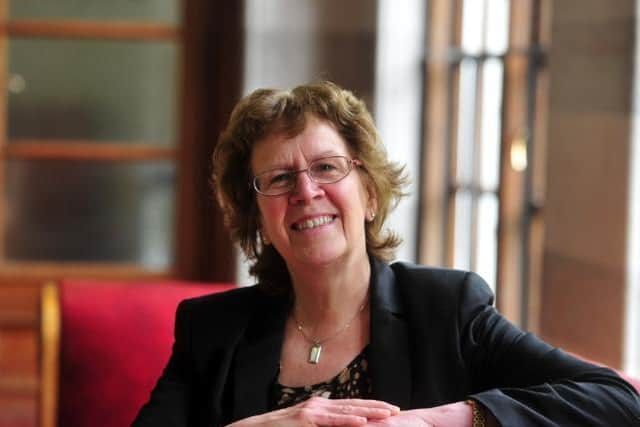From Leeds to the Lords - Interview with outgoing Leeds City Council leader Judith Blake
and live on Freeview channel 276
“Growing up, there was never any sense that we couldn’t put ourselves forward to do what we wanted to do.”
Born in St James’s hospital in 1953, Judith Blake (nee Parsons), attended school at Gledhow Primary, before going onto Leeds Girls’ High School. She cites her parents, both doctors, as integral to her principles growing up.
Advertisement
Hide AdAdvertisement
Hide Ad“The expectations of women generally were much more limited, and my family’s attitude was that there shouldn’t be any restrictions because you are a woman.


“I came from a long line of very strong women over a long time, and it wasn’t until I got older that i realised how unusual that was.”
It’s been an unusual political journey for Judith, who by her own admission did not get involved in party politics until the 1990s. She rose to the top job at Leeds City Council within two decades, before next month stepping up to become a lawmaker at the House of Lords.
It’s a far cry from when she left Leeds to study at the University of Kent when she was still a teenager.
Advertisement
Hide AdAdvertisement
Hide Ad“The most important thing at that age was to get as far away from Leeds as I could, and I was really lucky to be able to go down to Canterbury.
“Back then it was a hotbed of radicalism, and it suited me. I didn’t get involved with the Labour Party at the time – back then I saw myself as further to the left than Labour!”
Following stints working abroad, she settled in Birmingham and became a teacher. But the call of her hometown was strong, and she decided in the mid-1980s that she wanted to move back up north.
“I felt like I needed to go back to my roots, and you couldn’t beat Leeds as a place to live,” she said. “Having left Leeds and being really keen to get away, I really missed it enormously.”
Advertisement
Hide AdAdvertisement
Hide AdFollowing a campaign to keep her daughter’s school under local authority control in 1995, she was asked by the local Labour Party to stand as an Otley town councillor. After winning the seat, she was then selected to stand in Weetwood for Leeds City Council the following year.
“In 1996 we were winning seats in all parts of the city, because it was the end of a really unpopular tory government,” she said. “I can’t describe to you the feeling of going into the general election of 1997.
“I remember the day after the election, it was a very sunny May. People were stopping their cars and waving – the spirit was unbelievable, and there was a sense that at last we could do things for people we could represent.”
Judith became deputy leader of the Leeds Labour group in 2003 and, following a six year stint out of Leeds Council control, the party was returned to power in 2010. Following the stepping down of then-leader Keith Wakefield, Coun Blake became Leeds City Council’s first female leader in 2015.
Advertisement
Hide AdAdvertisement
Hide Ad“Stepping up in 2010 and then to being leader in 2015 felt like a natural progression,” she said. “It was the most incredible honour and privilege to become leader of my city.
“If I’m honest, we had reached a moment where we needed to tell the story of Leeds much more loudly, and really get out there and assert our position on the national stage.”
There was controversy over councillors’ approval in principle of Leeds Bradford Airport’s expansion plans earlier this month. How does she feel this tallies with the council’s championing of her own “climate emergency” declaration two years ago?
“There can be local attention around the bigger picture,” she said. “But until you get a proper national strategy with proper national investment, it feels as though we are being held back.
Advertisement
Hide AdAdvertisement
Hide Ad“In helping to promote the climate agenda, we really need to start seeing a massive shift in the government’s climate strategy, and that can empower us in the decisions we need to take.”
The twin political issues of today – Brexit and Covid-19 – often dominate both political and news agendas to the point where other subjects are drowned out.
How does she think Leeds can navigate such a tumultious time?
“With the pandemic and Brexit coming together, there is still a lack of clarity over what the impact of Brexit is going to be.
Advertisement
Hide AdAdvertisement
Hide Ad“At the moment, we are not in normal circumstances, so it is hard to have an appreciation of what all of those are going to mean, and also where the opportunities emerge that we can take advantage of.
“When the economy starts to unlock as a result of easing of restrictions, there will be more clarity. Covid will be with us in the future, but we need the mechanisms in place to be able to deal with it and control it.”
So any regrets from her time as leader?
“You have to learn from things that happen,” she said. “Things don’t always go the way you would want, but I prefer to look forward rather than backwards, recognising you have to keep an open mind, and you have to keep adapting to changing circumstances that come along.”